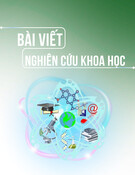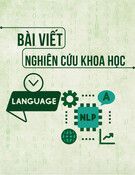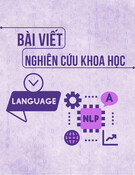
HUE UNIVERSITY
COLLEGE OF FOREIGN LANGUGES
DEPARTMENT OF ENGLISH
D
RESEARCH METHOD
Topic:
LEARNING LISTENING ENGLISH BY USING
COMPUTERS TO THE SECOND YEAR STUDENTS
OF ENGLISH MAJOR AT HUE COLLEGE OF
FOREIGN LANGUAGES.
Instructor: Students:
Phan Th Quỳnh Nhị ư Lê Th Thanh Ph cị ướ
Nguy n Th Thúy Hàễ ị
Đ ng Th Kim Thìnặ ị
Hue, 06/2010
INTRODUCTION

Today’s media such as Internet, TV and the press gives people almost
unlimited access to knowledge about their favorite subjects. After all, we live in
the information age. With computers which are necessary to update information
serving learning and working. One of the most effective tools is computer.
Besides using many media, use of computers is wide-spread in English
learning. Computers have been used for language teaching and learning ever
since the 1960s (Warschauer Mark & Healey (1998)). There are some
advantages when using computer for learning English. Especially, the most
effective use of computers is in learning listening English. Jamieson (2004 &
2005) discussed the advantages of using computers in the second language
learning listening English. He started “having many sources, finding many
different voices, having some interesting contents”. However, Healey (2007)
researched the difficulties of using computers in the second language learning
listening. She was concerned about enough computers to use.
Moreover, a number of studies on English listening have been conducted
in Vietnam. In Vietnam, along with the development of technological science,
computers are inserted teaching and learning foreign languages (Nguyen Van
Long, (2009)). The most outstanding advantages which internet provides
realistic materials of studying (Healey, 2001 & Felix, 1998) with updated
information very minute (Walker, Hewer and Davies, 2005). Ton Nu Xuan
Huong (2000) discussed the advantages of using computers in Danang foreign
languages. On base her subjective access by attending as an observer and
interviewing can acknowledge student’s learning listening English on
computers. Students can find themselves diverse material in internet to learning
listening English. Moreover, students can access material quickly and
accurately.
Generally, above researches showed these advantages on English listening
learning by computers. Besides, they only just advanced benefits but they have
not brought out disadvantages yet on English listening learning. So we decide to
research about learning listening English by using computers to the second year
students of English major at HCFL. Although HCFL is equipped computers for
students to study, the students have not achieved maximum effects on English
listening learning yet. Though there are computers, they are not enough. The
students know way to use computers but are not conversant. Therefore, the topic
of learning listening English by using computers is chosen. The researchers hope
that this topic will contribute a positive voice to develop new methods of
learning English. This research will be accomplished by answering 3 questions:
1. What do the students think about using computers for their major?
2. What are the positive effects of computers to learning listening English?
3. What should we do to using computers for listening English the most
effectively?
METHODOLOGY

This study will be carried out at HCFL with the cooperation of the second
year students of English major. 5 questions being involved in the using
computer for listening English will be handed to 50 participants. Besides,
about 10 students will be interviewed directly. Then, the answers will be
collected and analyzed by using tables or charts. From the data, this research
will be investigated and divided into 3 parts:
1. Student’s attitude about using computer for their major of English.
2. The positive effects of computer to learning listening English.
3. The way to use computer for listening English effectively.
FINDING AND DISCUSSION
1. Student’s attitude about using computer for their major of English.
The use of computer-adaptive testing (CAT) for placement testing
purposes has become an increasingly appealing and efficient method of
assessment. Simply put, CAT saves testing time and decreases examinee
frustration since low-ability examinees are not forced to take test items
constructed for high-ability testers, and vise versa. As Bergstrom and Gershon
(1994, p.1) note, “When the difficulty of items is targeted to the ability of
candidate, maximum information is obtained from each item for each candidate,
so test length can be shortened without loss of reliability. The American College
Testing program offers COMPASS, a computer-adaptive placement test given to
students entering college to assess their preparedness to do college work in
reading and math. A number of high-stakes tests in the United States are also
now administered in CAT form (e.g., Educational Testing Service’s Graduate
Record Examination), and those in charge of constructing the Test of English as
a Foreign Language (TOEFL) are in the process of developing a TOEFL CAT
for administration to various applicants taking the TOEFL in the twenty-first
century.
2. The positive effects of computer to learning listening English .
Students uniformly complained that listening classes were boring or
learned nothing from them. Ergo, “I believe the listening exercises, as I taught
them, were not primed for or well-integrated with the other topics of
discussion”. Perhaps another contributing factor is that listening is by nature
more passive and similar to test-taking; there is virtually no room for creativity
when completing the exercises. Listening to the radio or other programs
informally, as some students have suggested, might provide more space for
creative thought simply by releasing students from the obligation of answering
questions; the become free to concentrate on how what they hear provokes their
interest. “Give us a chance to listen to the programs of news, such as VOA,
BBC, and CNN to improve our listening skills. Let us listen to the English songs
or watch the movies. I hope our listening lessons should be improved”.
3. The ways to use computer for listening English effectively.

One of the best ways of improving your English is to listen to radio
news and discussion in English on your computer.
Watch breaking news. Although news TV like CNN is a lot more difficult
than TOEIC Listening Part One, if there is breaking news like parades and
other ceremonies, car chases, hostage stand off crises etc, this language is
similar to what you will hear when photos are described in the news.
Listen to audio commentary on DVDs. Again, films and TV series have
very different language to TOEIC Listening Part One.
Make your own home videos with audio commentary in English. If you
have a video camera, this is probably the audio visual thing that is most
similar to TOEIC Listening Part One.
SIGNIFICANCE
Despite the advantages of listening English by computers. In the fact that
using computers for learning listening English at HCFL is not carried out
widely. The reason is lack of facilities like listening rooms, computers,
headphones… Some implications therefore are suggested to improve the method
of learning listening English. Good facilities must be supplied for learning.
Holding the class of 20-25 students is also recommended. Students should be
taken into a well-cut off rooms help them concentrate on listening. A period of
listening English should be hold just about 45 minutes. It is good to have free
time to relax, because some students are not used to being the computer room
for a long time. Some websites of news in English like
www.voa.gov (voice of American),
www.bbc.co.uk/worldservice (BBC world service), CNN or Yahoo AP… are
suggested so that the students can practice listening. Hope that these suggestions
will help to promote learning listening better.

REFERENCE
1. Kuang-wu-lee (2000). English Teacher’s Barriers to the Use of
Computer-assisted Language Learning. The Internet TEST Journal
Retrieved on 12, 2000 from http://itesljorg/Articles / Lee-CALL barriers
html.
2. Ton Nu Xuan Huong. (2000). Khao sat nhung kho khan trong qua trinh
day ky nang nghe hieu cho sinh vien hoc Tieng Anh khong chuyen ngu.
Giao duc, 40-44.
3. Nguyen Van Long. (2009). Kho khan, thuan loi, giai phap viec day va hoc
ngoai ngu. Giao duc, 19-22.
4. Computer Assisted Language Learning: an Introduction. Warschauer
Mark. http://www.ict4lt.org/en/warschauer.htm. Retrieved on 2008-04-11.


















![Mẫu thư Tiếng Anh: Tài liệu [Mô tả chi tiết hơn về loại tài liệu hoặc mục đích sử dụng]](https://cdn.tailieu.vn/images/document/thumbnail/2025/20250814/vinhsannguyenphuc@gmail.com/135x160/71321755225259.jpg)







